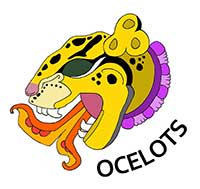OCELOTS - A Network for Facilitating Online Content for Experiential Learning of Tropical Systems (RCN-UBE Introduction)
Author(s): Ann E Russell1, Suzanne K. Macey2
1. Iowa State University 2. American Museum of Natural History
380 total view(s), 193 download(s)
- OCELOTS
ocelots logo.jpeg(JPEG | 239 KB)
ocelots page.png(PNG | 6 MB)
OCELOTS.jpg(JPG | 9 KB)
Support was provided by.docx(DOCX | 12 KB)
- License terms
Description
Life science students must be prepared for solving ‘wicked’ problems, i.e., complex ones without clear solutions. These problems require higher-level thinking about the connections across scales and disciplines, and within a global context. Tropical biology provides opportunities for studying this kind of complexity, from the interactions of organisms in highly diverse communities to the web of social and economic considerations that guide the processes and conservation of tropical species and ecosystems. Despite this, most core undergraduate biology curricula retain a primarily temperate-zone lens and limited exposure to the global diversity of ecosystems and cultures. At the same time, there is a critical need for online open educational resources (OERs) that incorporate real-world examples and are easy for both students and instructors to access and use. This network brings together a diverse community of experts with backgrounds in tropical biology research, active-learning pedagogy, software development, and multimedia content creation. The network activities support faculty participants in the creation, adaptation, and implementation of field- and research-based OERs. These online modules are hosted on a responsively designed, open-source and open-access platform, Gala (www.learngala.com).
The goals of the Online Content for Experiential Learning of Tropical Systems network are to: 1) Internationalize the undergraduate biology curriculum through the creation of OERs in tropical ecology; 2) Enhance and innovate within platforms such as Gala to facilitate the integration of quantitative elements within OERs; 3) Broaden participation within the biology community by engaging participants from under-represented groups, HBCUs and community colleges. The collaborations include: professional societies (Association for Tropical Biology and Conservation, ATBC; Ecological Society of America, ESA); NGOs (American Museum of Natural History, Organization for Tropical Studies, Howard Hughes Medical Institute BioInteractive); software platforms (Gala and QUBES); and other NSF-funded projects.
Activities include: 1) initial workshops to create author guidelines and toolkits; 2) 'Incubator' workshops to develop new OERs; 3) Faculty Mentoring Networks for implementing OCELOTS OERs in the classroom; and 4) engagement with professional societies and other networks to expand and sustain this network. For each module, design and development of interactive and quantitative elements, is undertaken in collaboration with the developers of the Gala platform and Quantitative Undergraduate Biology Education and Synthesis. As this network’s agile process for creating OERs is refined, it is providing a novel framework for OER development that can help propel STEM education in fields beyond tropical biology.
Ways to learn more:
- Russell, A. E., Aide, T. M., Braker, E., Ganong, C. N., Hardin, R. D., Holl, K. D., ... & Willis, C. G. (2022). Integrating tropical research into biology education is urgently needed. PLoS biology, 20(6), e3001674.
- Russell, A. E., Willis, C., Beck, C., Macey, S. (2023). Turning ecological research into engaging online modules for undergraduates through Gala/OCELOTS. QUBES Educational Resources. doi:10.25334/Q6YV-M789
- Russell, A. E., Oosterom, A., Marek, E., Zhou, L. (2023). Healing the scars: Tropical rainforest carbon cycling. Does it matter which tree species you plant?. OCELOTS, QUBES Educational Resources. doi:10.25334/6J0J-E691
- Maharjan, S. K. (2023). Healing the scars: A tropical rainforest carbon cycling module implemented in a Forest Ecology course. OCELOTS FMN: Implementing an online module in tropical biology, QUBES Educational Resources. doi:10.25334/RARX-F846
- Bower, A. H. (2023). SNAPSHOT SERENGETI: Analyzing Wildlife Ecological Relationships in an upper-level Ecology course. OCELOTS FMN: Implementing an online module in tropical biology, QUBES Educational Resources. doi:10.25334/NQDS-H553
Ways to get involved:
Please visit ‘How to Participate’ for details:
- ATBC Workshop: July 2, 2023 at Annual Meeting in Coimbatore, India
- ESA Workshop: August 7, 2023 at Annual Meeting in Portland, OR
- OCELOTS Incubator: Creating an online module in tropical biology. September 2023 to May 2024
- OCELOTS FMN: Implementing a module in tropical biology. January to May 2024.
If you are interested in learning more and participating, please join this group or email Ann Russell or Suzanne Macey.
Support was provided by: A grant from the United States National Science Foundation (DBI-RCN-UBE 2120141).
Cite this work
Researchers should cite this work as follows:
- Russell, A. E., Macey, S. K. (2023). OCELOTS - A Network for Facilitating Online Content for Experiential Learning of Tropical Systems (RCN-UBE Introduction). RCN-UBE Community, QUBES Educational Resources. doi:10.25334/6VEM-CH35


 RCN-UBE #2120141
RCN-UBE #2120141